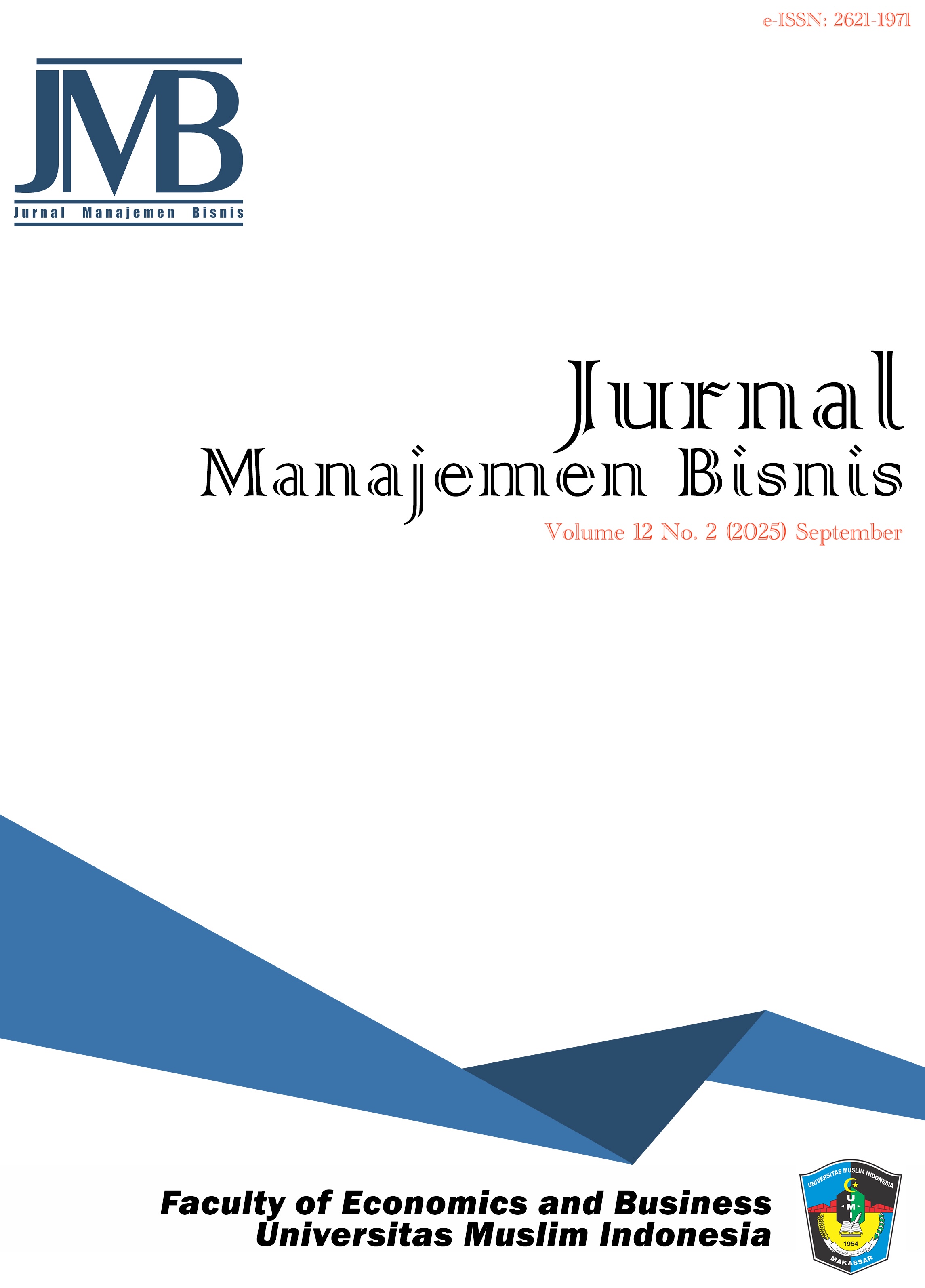Exploring the Role of Commitment, Support, and Satisfaction in Shaping Innovative Behavior of Public Sector Employees
DOI:
https://doi.org/10.33096/jmb.v12i2.1194Keywords:
Affective Commitment, Organizational Support, Job Satisfaction, Innovative BehaviorAbstract
This study aims to analyze the influence of affective commitment, organizational support, and job satisfaction on the innovative behavior of employees of the Yogyakarta City Environmental Service. This study uses a quantitative approach with a positivistic paradigm. The research sample consisted of 50 permanent employees selected through purposive sampling techniques. The data collection instrument was a Likert scale questionnaire 1–5 which had been tested for validity and reliability. The data were analyzed using multiple linear regression techniques with the help of SPSS software. The results showed that affective commitment (p = 0.000, t = 9.635) and organizational support (p = 0.002, t = 3.199) had a positive and significant effect on innovative behavior. However, job satisfaction did not have a significant effect (p = 0.019, t = -2.433). Simultaneously, the three independent variables had an influence of 76.5% on employee innovative behavior. These findings emphasize the importance of strengthening emotional commitment and organizational support in order to increase innovative capacity in the public sector work environment.
Downloads
References
Alshebami, A. S. (2021). The influence of psychological capital on employees’ innovative behavior: Mediating role of employees’ innovative intention and employees’ job satisfaction. SAGE Open, 11(3). https://doi.org/10.1177/21582440211040809
Anjar, A., Siregar, M., Toni, Ritonga, M. K., Harahap, H. S., & Siregar, Z. A. (2020). The influence of innovative behavior on the performance of elementary school principals in Labuhanbatu Regency. Journal of Education and Development of South Tapanuli Institute of Education, 8(3), 26–32.
Ariyani, R. P. N., & Sugiyanto, E. K. (2020). The effect of affective commitment, sustainable commitment and normative commitment on employee performance (Study of BUMN X Company in Semarang). Scientific Journal of Management Ubhara, 2(2), 113. https://doi.org/10.31599/jmu.v2i2.772
Ayuni, E., & Etikariena, A. (2020). How are perceptions of organizational support and innovative work behaviors interrelated? The role of work attachment mediation. Journal of Psychogenesis, 8(1). https://doi.org/10.24854/jps.v8i1.1260
Creswell, J. W. (2018). Research design: Qualitative, quantitative, and mixed methods approaches (5th ed.). Sage.
Darmawan, D. (2021). Metode penelitian kuantitatif. Bandung: Remaja Rosdakarya.
Etikan, I., Musa, S. A., & Alkassim, R. S. (2016). Comparison of convenience sampling and purposive sampling. American Journal of Theoretical and Applied Statistics, 5(1), 1–4. https://doi.org/10.11648/j.ajtas.20160501.11
Ghozali, I. (2018). Aplikasi analisis multivariate dengan program IBM SPSS 25. Semarang: Badan Penerbit Universitas Diponegoro.
Hadi, S., Putra, A. R., & Mardikaningsih, R. (2020). The influence of innovative behavior and work engagement on employee performance. Baruna Horizon Journal, 3(1). https://doi.org/10.52310/jbhorizon.v3i1.38
Hairani. (2021). The mediation role of affective commitment on the influence of organizational justice on innovative behavior. Journal of Community Empowerment, 2(2).
Luthans, F. (2011). Organizational behavior: An evidence-based approach (12th ed.). McGraw-Hill Education.
Marto Hendry, R. S. (2018). The effect of work facilities and organizational support on employee job satisfaction at the Labuhan Batu Utara Regency Environmental Office. INFORMATICS, 6(1). https://doi.org/10.36987/informatika.v6i1.1860
Miao, R. T. (2011). Perceived organizational support, job satisfaction, task performance and organizational citizenship behavior in China. Journal of Behavioral and Applied Management, 12(2), 105–127.
Mokhber, M., Khairuzzaman, W., & Vakilbashi, A. (2018). Leadership and innovation: The moderator role of organization support for innovative behaviors. Journal of Management and Organization, 24(1). https://doi.org/10.1017/jmo.2017.26
Nasution, N. R., Siregar, Z. M. E., & Pristiyono, P. (2021). The effect of job autonomy on employee innovative behavior: The role of job satisfaction as intervening variable. Budapest International Research and Critics Institute (BIRCI-Journal): Humanities and Social Sciences, 4(2). https://doi.org/10.33258/birci.v4i2.1994
Nurmawati, I., & Arofah, K. (2021). Analysis of aspects of organizational and management support for the duplication of medical record numbers of health centers. Journal of Health Management Indonesia, 9(1). https://doi.org/10.14710/jmki.9.1.2021.14-20
Pangestuti, D. C. (2018). The effect of organizational support perception, job satisfaction and affective commitment on organizational citizenship behavior. Journal of Management Partners, 2(4), 366–381. https://doi.org/10.52160/ejmm.v2i4.128
Riadi, M. (2020). Definition and types of research variables. Kajianpustaka.com. https://www.kajianpustaka.com/2020/09/pengertian-dan-jenis-variabel-penelitian.html
Rizana, D. (2018). The influence of knowledge sharing behavior, perception of organizational support and person job fit on innovative behavior. Business Focus: Media for Management and Accounting Studies, 16(2). https://doi.org/10.32639/fokusbisnis.v16i2.168
Salmawati, S., & Kurniawan, I. S. (2022). The influence of career development, job satisfaction, employee work involvement, and work spirit on affective commitment at CV Harico Sleman Regency. Al-Kharaj: Journal of Sharia Economics, Finance & Business, 4(4). https://doi.org/10.47467/alkharaj.v4i4.772
Sena, A., Cahyono, Y., & Purwanto, A. (2020). The influence of organizational culture, job satisfaction, and professional commitment on innovative behavior of flight instructors at the civil flight school in Indonesia. Systematic Reviews in Pharmacy, 11(9). https://doi.org/10.31838/srp.2020.9.137
Sinambela, E. A. (2021). Work motivation and organizational support and its influence on affective commitment. Baruna Horizon Journal, 4(1). https://doi.org/10.52310/jbhorizon.v4i1.55
Sujarwo, A., & Wahjono. (2017). The effect of work motivation and innovative behavior on employee performance with job satisfaction as a mediation variable (Case study on LKP ALFABANK Semarang). Infokam, 1, 63–71.
Sugiyono. (2017). Metode penelitian kuantitatif, kualitatif, dan R&D. Bandung: Alfabeta.
Sunarta, S. (2019). The importance of job satisfaction. Efficiency – Administrative Science Studies, 16(2). https://doi.org/10.21831/efisiensi.v16i2.27421
Susanti, F., & L., -. (2021). The effect of motivation and job satisfaction on the innovative behavior of employees of Bank Indonesia Representative Office in West Sumatra Province. Journal of Social Administration and Humanities, 4(3). https://doi.org/10.56957/jsr.v4i3.189
Tang, Y., Shao, Y. F., & Chen, Y. J. (2019). Assessing the mediation mechanism of job satisfaction and organizational commitment on innovative behavior: The perspective of psychological capital. Frontiers in Psychology, 10. https://doi.org/10.3389/fpsyg.2019.02699
Downloads
Published
Issue
Section
License
Copyright (c) 2025 Jurnal Manajemen Bisnis

This work is licensed under a Creative Commons Attribution 4.0 International License.






